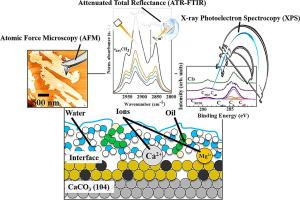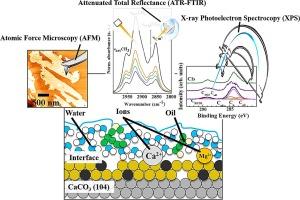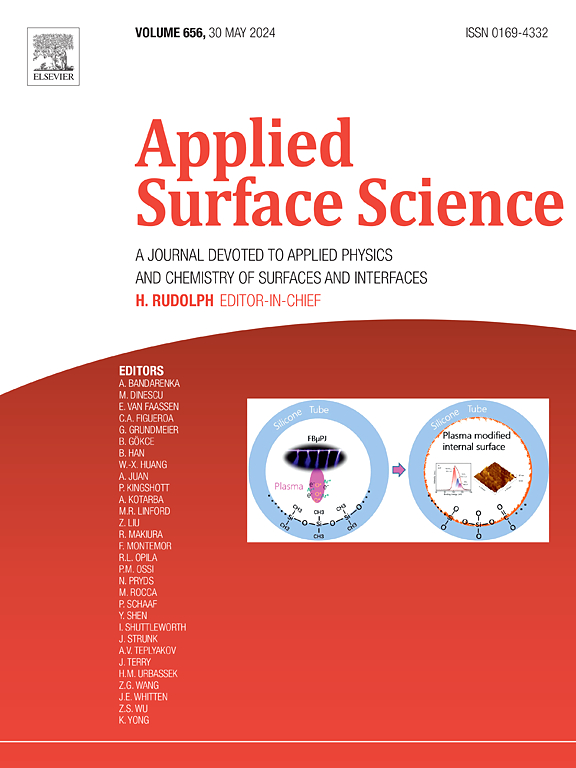调查低盐度水中过量 Ca2+ 和 Mg2+ 离子对钙钛矿除油、溶解和溶解过程的影响
IF 6.3
2区 材料科学
Q2 CHEMISTRY, PHYSICAL
引用次数: 0
摘要
从油湿方解石表面到水湿方解石表面的转变对于提高石油采收率至关重要,而且会受到低盐度(LS)水的影响。以往的研究探讨了低盐水或单离子溶液对岩油界面的影响,但低盐水中过量的活性离子对润湿性的影响仍不确定。这项工作旨在确定 Ca2+ 或 Mg2+ 离子在改变润湿性和石油采收率方面是否更有效,并确定 Nujol 方解石系统的最佳盐度。使用富含 Ca2+ 或 Mg2+ 的 LS 水(LS25、LS50、LS75 和 LS100)处理油湿方解石表面之前和之后的特征,与地层水相比,LS 水稀释了 25、50、75 和 100 倍(LS25、LS50、LS75 和 LS100)。盐度为 3173 ppm 的 LS75 除油效果最好,采油率达到 81%。经 ATR-FTIR 和接触角测量证实,LS75Mg 可去除 75% 的油,LS75Ca 可去除 65% 的油。与 LS75Ca(145°)相比,LS75Mg 的接触角(∼160°)也更大,这表明它的脱油效果更好。通过地形分析可观察到表面变化,包括溶解和油破碎(尤其是 LS75Mg 和 LS100Mg)。XPS 结果显示,处理过的表面 Na+、Cl- 和 Mg2+ 含量较高,其中 LS50Mg 表面碳含量的减少最为显著。在最佳盐度下,Ca2+ 和 Mg2+ 的组合可提高除油效果,而过量的 Mg2+ 单独使用则效果较差。本文讨论了油类去除背后的竞争机制及其对盐水成分的依赖性。本文章由计算机程序翻译,如有差异,请以英文原文为准。


Investigation of the effects of an excess of Ca2+ and Mg2+ ions in low salinity water in the process of oil removal, dissolution, and solvation in calcites
The transition from an oil-wet to a water-wet calcite surface is crucial for enhanced oil recovery and can be influenced by low salinity (LS) water. While previous studies have explored the effects of LS water or single-ion solutions on rock-oil interfaces, the impact of excess active ions in LS on wettability remains uncertain. This work aims to determine whether Ca2+ or Mg2+ ions are more effective in altering wettability and oil recovery and to identify the optimal salinity for the Nujol-calcite system. Oil-wet calcite surfaces were characterized before and after treatment with LS water rich in Ca2+ or Mg2+, diluted 25, 50, 75, and 100 times (LS25, LS50, LS75, and LS100) compared to formation water. LS75, with a salinity of 3173 ppm, was the most effective for oil removal, achieving 81 % oil recovery. LS75Mg removed 75 % of the oil, and LS75Ca removed 65 %, as confirmed by ATR-FTIR and contact angle measurements. LS75Mg also showed a larger contact angle (∼160°) than LS75Ca (145°), indicating better oil detachment. Surface changes, including dissolution and oil fragmentation (especially with LS75Mg and LS100Mg), were observed via topographical analysis. XPS results revealed higher Na+, Cl−, and Mg2+ levels on treated surfaces, with LS50Mg showing the most significant reduction of surface carbon content. While a combination of Ca2+ and Mg2+ at optimal salinity enhances oil removal, excess Mg2+ alone is less effective. The competitive mechanisms behind oil removal and their dependence on brine composition are discussed.
求助全文
通过发布文献求助,成功后即可免费获取论文全文。
去求助
来源期刊

Applied Surface Science
工程技术-材料科学:膜
CiteScore
12.50
自引率
7.50%
发文量
3393
审稿时长
67 days
期刊介绍:
Applied Surface Science covers topics contributing to a better understanding of surfaces, interfaces, nanostructures and their applications. The journal is concerned with scientific research on the atomic and molecular level of material properties determined with specific surface analytical techniques and/or computational methods, as well as the processing of such structures.
 求助内容:
求助内容: 应助结果提醒方式:
应助结果提醒方式:


